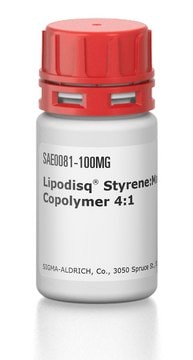SAE0082
Lipodisq® Styrene:Maleic Anhydride Copolymer 4:1, Pre-hydrolyzed
Sign Into View Organizational & Contract Pricing
All Photos(2)
About This Item
UNSPSC Code:
12352202
NACRES:
NA.25
Recommended Products
General description
This product is the pre-hydrolyzed form of the Styrene:Maleic Anhydride Copolymer 4:1. It can be regarded, in effect, as Styrene:Maleic Acid Copolymer 4:1 (SMA Copolymer 4:1).
Application
Lipodisq reagents are novel polymers derived from styrene and maleic acid. Lipodisq polymers are capable of forming nanosized lipid-based discoidal particles capable of incorporating membrane proteins. The Lipodisq technology can solubilize commonly used lipids such as dimyristoylphosphatidylcholine (DMPC) without the use of detergents. Lipodisqs typically have a diameter of 9-10 nm at pH 7.4.
The Lipodisq technology can solubilize commonly used lipids such as dimyristoylphosphatidylcholine (DMPC) without the use of detergents.
Functional pH range: 8.5 - 10.5
The Lipodisq technology can solubilize commonly used lipids such as dimyristoylphosphatidylcholine (DMPC) without the use of detergents.
Functional pH range: 8.5 - 10.5
Legal Information
Lipodisq is a registered trademark of Malvern Cosmeceutics Limited
Storage Class Code
11 - Combustible Solids
WGK
WGK 3
Flash Point(F)
Not applicable
Flash Point(C)
Not applicable
Certificates of Analysis (COA)
Search for Certificates of Analysis (COA) by entering the products Lot/Batch Number. Lot and Batch Numbers can be found on a product’s label following the words ‘Lot’ or ‘Batch’.
Already Own This Product?
Find documentation for the products that you have recently purchased in the Document Library.
Juan Francisco Bada Juarez et al.
Chemistry and physics of lipids, 221, 167-175 (2019-04-04)
Nanoparticles assembled with poly(styrene-maleic acid) copolymers, identified in the literature as Lipodisq, SMALPs or Native Nanodisc, are routinely used as membrane mimetics to stabilise protein structures in their native conformation. To date, transmembrane proteins of varying complexity (up to 8
Our team of scientists has experience in all areas of research including Life Science, Material Science, Chemical Synthesis, Chromatography, Analytical and many others.
Contact Technical Service








